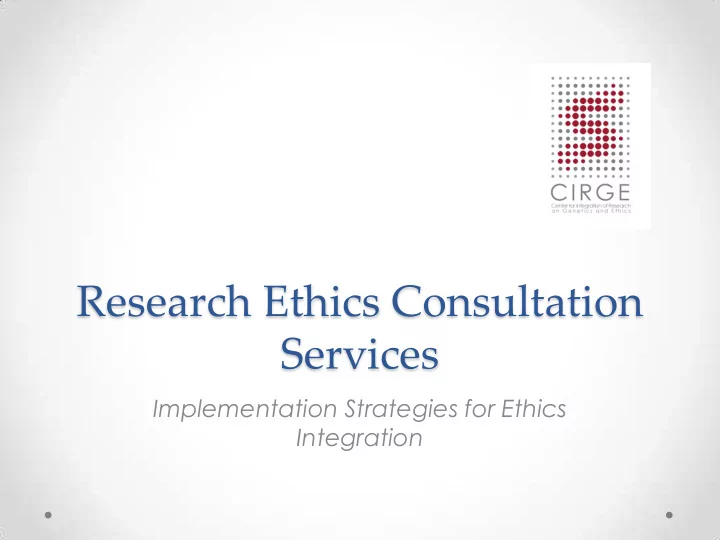

Research Ethics Consultation Services Implementation Strategies for Ethics Integration
Purpose of RECS • “Our model of research ethics consultation has the overall goal of maximizing the benefits and minimizing potential harms of research to society” • An alternative to top down approaches but scalable • An adjunct to policy approaches (e.g. NSABB) that require scientist awareness and initiative • To provide a forum for consideration of issues beyond misconduct/RCR and those that are required by regulation o social responsibility
Current status of BECS • Stanford Benchside Ethics Consultation Service • Has provided consultation to Stanford biomedical researchers, biotech and pharma companies, IRBs, hospital ethics committees, funding agencies, journal editors, research participants • Wide variety of consultation topics o Not limited to human subjects or clinical research o Very few about misconduct or RCR • Focus on early stages of research
Current status of BECS • Project-specific consultation topics o Incidental findings o Research vs. clinical practice o Clinical research design o Biobanking • Field-based topics o Synthetic genomics o Biotic games* o Chimeras and neuronal implants into brain* o Non-invasive prenatal genetic testing* o Trauma research*
CTSA RECS • In 2010: 33/46 (70%) of CTSA institutions had a RECS o 9 started prior to CTSA o Only 2 were in existence for 6+ years • 9/33 (27%) provided consultations outside institution • 25/33 (76%) were supported by CTSA • 8/33 (24%) had no funding • 6/33 conducted >10 consultations in the prior year • Most conducted <5 in the prior year
Future of CTSA RECS • National collaborative consultation service o National database of CTSA RECS consultations • Nature and extent of CTSA support uncertain
RECS utilization • Survey of 856 US life scientists o Faculty, staff, postdocs, graduate students • 51% reported that they would find a RECS moderately, very or extremely useful for their institution • 36% reported that they would find a RECS useful personally • 36% reported that an “ethical or societal question” arose in the course of their own research at least once
Potential barriers Lack of awareness, relevance • o “I think a major issue is that many scientists, myself included, don’t have a clear idea of what an ethical issue necessarily is, and if it applies to them .” Perceived lack of need for consultation • o “I feel I am able to determine and resolve ethical and societal concerns pertaining to my research on my own .” Perceived incongruence with scientific goals and • practice o “ When you decide on different experiments that you want to do, the first consideration is of course to make sure you have the appropriate techniques to be able to do it, but secondly, is it an interesting question just scientifically speaking, just academically, aside from any beneficial contributions it could possibly make. And once you’ve established that, it’s up to you ... if you wanna also emphasize therapeutic applications ... “
Measuring success Requires definition of what goals are • Outcomes and process measures • Increasing uptake, early stage utilization • Identification of emerging ethical issues • Researcher/bioethics collaborations, publications • Research project modifications and policy changes • Researcher satisfaction and attitudes • Climate change – permission, encouragement, • expectation o “Wow Mildred, this is so *cool*! Thank you! It's very rare that we get help that is so on target, succinct and helpful. Really terrific .”
Conclusions Research ethics consultation is becoming an established • institutional mechanism in the US for integrating ethical and societal considerations into biomedical research RECS can address a broad range of topics and provide • services to a range of clients RECS provides opportunities for addressing not only • project-specific ethical issues but also those facing whole fields, going beyond RCR RECS provides opportunities for interdisciplinary • collaboration and climate change RECS may benefit from institutional support and • leadership to encourage use
Recommend
More recommend